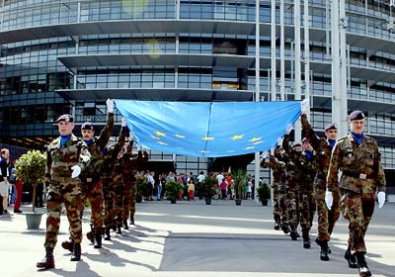How the EU Operates - after Lisbon - Democrat March-April 2010 (Number 117)

EU Troops raising the flag
With a backdrop of arguments and horse trading, plans for the EU's new diplomatic corps have entered their final stage. Member States have quietly begun to negotiate over who will take the top jobs which are up for grabs.
The office of EU foreign relations chief Catherine Ashton was aiming to submit a draft organigram (chart) for the European External Action Service (EAS) to EU diplomats in Brussels on 17 March.
According to an EU official acquainted with the document, Ms Ashton's office wants the service to have nine senior posts: A secretary general, two deputy secretary generals and, below them, six director generals (DGs).
The DGs will each run a department consisting of hundreds of officials. The directorates will oversee the budget and personnel. A second one will deal with ‘global affairs’ including democracy promotion. A third will manage EU relations with the UN and G20, legal and consular affairs. The other three will cover geographical areas including EU neighbours, industrialised countries and developing states.
At the top of the hierarchy, Ms Ashton will mainly do shuttle diplomacy on the model of her predecessor, Javier Solana, who clocked up over 2.6 million air miles in his 10 years in office. The EU's eleven ‘special representatives’ report directly to her.
The secretary general is to stay in Brussels and run the EAS on a day-to-day basis.
He will oversee the work of the six director generals and a number of autonomous EAS cells. These consist of: the EU's Military Staff, responsible for planning overseas military missions; SitCen, an intelligence-sharing bureau; an internal security unit; an internal audit unit and a department handling communications and relations with other EU institutions.
The two deputy secretary generals will not have administrative duties, freeing them up to replace Ms Ashton at internal EU meetings or second-tier international events.
EU capitals are wary of openly lobbying for their candidates due to the accepted wisdom that early runners do not finish first.
The newer EU member states are pushing for senior EAS posts to be open to free competition based on merit. But it is clear that the top nine appointments will be political decisions with Germany and France taking key posts.
Poland, Hungary, Slovakia and the Czech Republic had warned that member states could disengage from EU foreign policy unless they get a fair share of power in its new diplomatic corps.
"The eventual lack of [member states'] involvement in shaping and implementing policies could lead to the loss of their interest in EU foreign policy and could even result in a widening gap between EU and national policies," the group of four countries said in an informal paper circulated in Brussels in February.
The European Commission and the European Parliament are also circulating draft organigrams with competing ideas for the EAS structure. "There's probably a draft organigram on every floor of every EU building in Brussels," another EU diplomat said.
Heavily edited and based on two pieces in EUobserver on 10 & 12.3.10 by Andrew Rettman